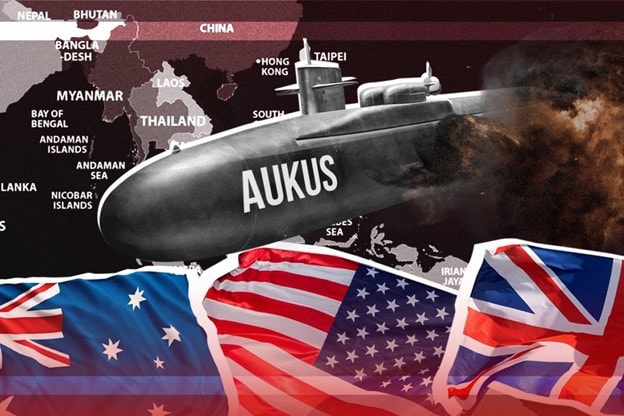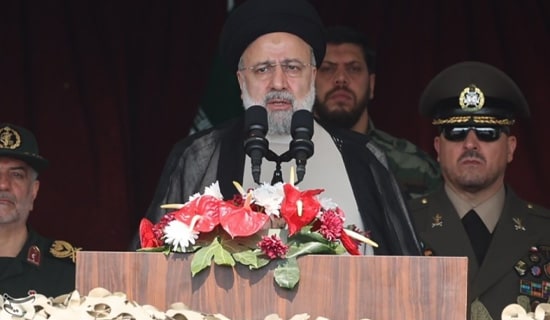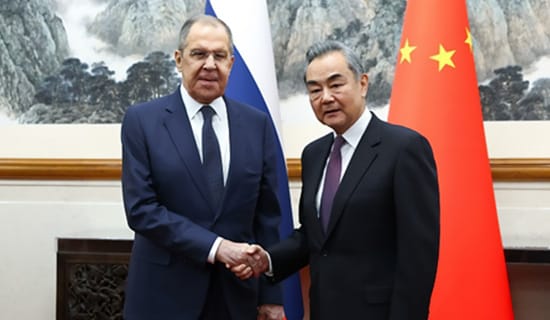The attempt to detach France from the Western Alliance has been a constant in Soviet/Russian diplomacy, and the new AUKUS defense partnership between the US, the UK and Australia granting Canberra access to US nuclear submarine technology is seen by Ria Novosti commentator Petr Akopov as an opportunity to wean France from the "Anglo-Saxons". While Akopov defends Russia's intrusion into Francophone Africa as a response to invitation by legitimate African governments, he claims that Russia has been considerate of French interests. No similar deference was exhibited by the Anglo-Saxons when they persuaded the Australians to renounce a 60-billion-dollar contract on the supply of submarines. France, claims Akopov has earned this disdain by acting as a doormat and continuing to adhere to the Western alliance, despite the tangible losses that it incurs in the process:
Akopov's analysis follows below:[1]

The lynchpin of AUKUS is the scrapping of the France-Australia submarine contract in favor of America nuclear subs. (Image: Nezavisim.tv)
"France is very dissatisfied, because it is being squeezed out on all fronts. Paris didn't manage to get indignant over rumors of a Russian military presence in Mali, when a new blow followed from a most unexpected side– the US.
"True, formally it was Australia that 'stabbed France in the back' by renouncing the 60 billion USD worth contract on supply of submarines. Although everyone is well aware, who actually instigated what occurred. France's Anglo-Saxon allies [were the instigators], because it was precisely the US and Britain who signed a new security and defense partnership (AUKUS), under which the Americans decided to transfer technology for construction of nuclear submarines to the continental state [Australia]. And so, the French shipbuilders were left without a fifty-year-long contract.
"Paris doesn't hide its indignation, but it can do nothing about Moscow or Washington.
"When the French press reported that the Mali authorities were on the brink of signing an agreement on the deployment of about a thousand fighters of the Russian PMCs in the country (serving in the capacity as training instructors for the local troops), the French Minister for Europe and Foreign Affairs Jean-Yves Le Drian was very rather displeased with the news and even claimed that in such an event the French would withdraw their soldiers. I'm not talking about the planned cutback as part of the completion of Operation 'Barkhan' (which was conducted across the Africa's Sahel region) recently announced by president Macron. According to the president, France intends to reduce its military presence in the region by half in two years.
"Le Drian hinted at a complete withdrawal of French troops from Mali should the Russians appear there, 'Their deployment in the country is incompatible with our presence. (...) I want this message to be heard.'
SUPPORT OUR WORK

"A strange statement, to put it mildly. It's strange not because France won't simply withdraw its contingent from Mali (according to the French press, last month president Macron 'explained to Putin what we were doing. It was conveyed to Putin that we were not going to withdraw our troops from Mali'), but because it shows the real attitude towards the sovereignty of a former colony. Doesn't Mali enjoy the right to manage its own security issues? After all a thousand Wagner Group contract soldiers are no match in capabilities and equipment to the French soldiers operating in the region.
"True, Russia has been actively increasing its presence in Africa in recent years (including 'French' Africa). The Central African Republic, in which our military instructors are operating, is the most prominent example. They were invited there by the legitimate authorities, while France itself frequently staged military interventions in various countries of the region, without even bothering to come up with a justification for its 'right to interfere.'
"Why was Paris's reaction to the Russian presence so touchy? Is it because France perceives the Russians as competitors, including over the control of strategic resources? But China provides a more prominent presence in the African states' economies than Russia. The same is true for Turkey and Japan, India and South Korea, not to mention the US. However, it was the Russians, who aroused such acute displeasure in Paris. Well, the answer is quite simple: Moscow, inter alia, is helping African states to strengthen their armies, i.e. making them more independent of the French. This is absolutely unacceptable for the French. No matter how many beautiful words French politicians speak about the strengthening the viability of African states, France is not going to let them out of its tight embrace. Are they that tight, though?
"Nevertheless, Russia is willing (to a limit) to consider France's interests in African affairs (and not only in West Africa, but also in Libya). [Moscow is ready] to compete with and rival [the French], but definitely not to fight in African deserts and savannahs.
"Because, France interests us primarily as a major European player. After all our relations with the country primarily concern European affairs. We are not allies, but objective geopolitical laws propel the two countries into partnership on a variety of issues. It is not Moscow's fault that Paris often lacks the strategic vision and the will to exploit these opportunities.
"After all, the country's sovereignty is limited by its alliance commitments within the North Atlantic Treaty and the European Union (as well as by the Atlantic-orientation of a major part of the ruling elite). The Mistral case was also quite telling. The refusal to supply the ships to Russia demonstrated the full extent of Paris's dependence on Washington. What's more this is unrequited dependence, as has become evident in the current story with the submarines for Australia.
"Naturally Australia is now being scolded in Paris. 'This decision contravenes the letter and spirit of Australia-France cooperation, which is based on relations of political trust,' reads the joint statement of the foreign and defense ministers. But the main accusations are targeted on the US and Britain, 'The American choice to leading to the abandonment of a European ally and partner such as France, to withdraw from a constructive partnership with Australia, at a time when we are facing unprecedented challenges in the region, (...) shows a lack of coherence, which France regrets.'
"Minister of Defense, Florence Parly stated that 'it's obvious now how the US treats its allies', while Le Drian called the US action 'a unilateral, cruel and unpredictable decision.'
"These are just the statements of the officials; the press was much more outspoken. Figaro calls the case a 'new Trafalgar', thus comparing it to the defeat of Napoleon's fleet by Nelson. Libération writes of a slap in country's face to France, which was 'humiliated and abandoned' by its closest allies. Le Monde notes the rising tensions between Paris and London and warns of a diplomatic crisis between Paris and Washington.
"No matter how the Americans (and Australians) tried to justify their actions, claiming how much they value France and need to be in alliance with it, everyone in Paris understands, France was put in its place in the world. Particularly offensive is that the What adds to the indignation is that the pretext for the 'stab in the back' was concern for security in the Indo-Pacific (this is how the Anglo-Saxons call their strategy of forming an anti-Chinese coalition). After all, France considers itself to be part of this region!
"'The only European country present in the Indo-Pacific region, with nearly two million of the country's citizens and more than seven thousand soldiers, France is a reliable partner that will continue to fulfill its obligations, as always.'
"True, France has several overseas departments and regions in the Pacific and the Indian Ocean. However, Paris was sidelined, [its allies] established a new strategy without taking the country into account. But Paris has essentially come to terms with it, as if saying, 'True, you ditched us, but we are still allies and are committed to supporting the 'transatlantic partnership in the region.' In other words, France will support the expansion of the Atlantic project into the Pacific region, and the Anglo-Saxon plans to contain and counter China. Despite the fact that these plans of others are absolutely disadvantageous for France (even if one will turn a blind eye to losses of 60 billion USD).
"After this, is it any wonder that your senior North Atlantic Alliance comrades don't take you into account?"

Petr Akopov (Source: Izborsk.md)
[1] Ria.ru, September 20, 2021.




